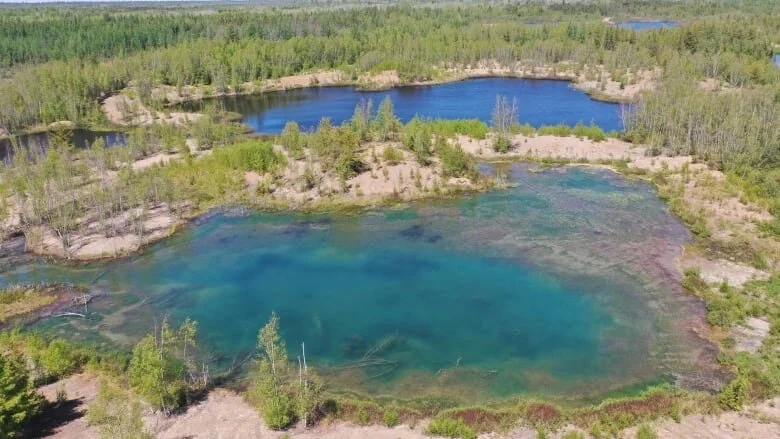With hits like the "Roughest Neck Around" that celebrate oil workers, Canadian country rocker Corb Lund might not be an obvious choice as a campaigner against fossil fuel expansion. But the music star has taken on an unexpected new role, as a leader of efforts to stop new open-pit coal mines in western Canada's iconic Rocky Mountains. Alberta’s province, dubbed "Canada's Texas" by political scientists for its petroleum industry and conservative political culture, has been hit by the cancellation of the planned Keystone XL pipeline to the United States, as US President Joe Biden's administration steps up action on climate change.
Tropical oasis in N.B.? Nope — just remnants of Minto's mining history
"Every one of these bodies of water are man-made — there's hardly any natural ones here," he said, adding that some of the ponds are more than 30 metres deep. Allison Enright, an assistant professor of aqueous and environmental geochemistry at the University of New Brunswick, has studied the water at the former coal-mining site. She said there are tiny sediment particles in the water, remains from the mining activity and invisible to the naked eye. "They tend to stay floating or suspended within the water of the lake, and then this interacts with the light on the surface and in the water body to give you this really bright blue colour," she explained. As for why some of the ponds are a different colour blue, Enright said it just depends how much sediment is in each body of water. Despite the peculiar hues, she said, it's not dangerous. "In this area, over several decades of efforts to remediate, the pH of this water has been made completely safe," she said.
'An abomination': Sask. water expert warns of contamination following Alberta's coal policy changes
Alberta's plan to allow for open-pit coal mining in the Rocky Mountains could be a serious threat to Saskatchewan's water supply, says the director of the Global Water Futures Project at the University of Saskatchewan. "For a water scientist to see this happening, it's just an abomination to have these types of developments suggested in the headwaters of the rivers that supply drinking water and the economy for most of Saskatchewan," John Pomeroy told CBC's Blue Sky. Last spring, the Alberta government revoked a 1976 policy that blocked open-pit coal mining on the eastern slopes and peaks of the Rockies.
Calgary’s water likely safe following coal policy changes, High River area a concern
Following public uproar of the Alberta government quietly pulling the 1976 coal policy, opening up more areas of the province for coal mining, a Calgary committee has started work to find out how those changes could affect the city on the Bow and Elbow Rivers. “The good news is, we found out today that although there’s different (land use) categories, the main category of the national parks and everything for our river system in the Bow is not affected with this policy,” Ward 1 Coun. Ward Sutherland said. “Obviously we’re very pleased with that.”
Contaminant from coal mines already high in some Alberta rivers: unreported data
The province's plan for large-scale expansion of the industry is fueling widespread criticism that includes concerns over selenium pollution. The data shows that same contaminant has been found for years at high levels downstream of three mines and never publicly reported. The findings raise questions about Alberta Environment, said a former senior official who has seen the data. "There were lots of [selenium] numbers and it was consistently above the water quality guidelines and in many cases way higher," said Bill Donahue, the department's one-time executive director of science. "Why did Alberta Environment sit on these data for easily the last 10 to 15 years?"






